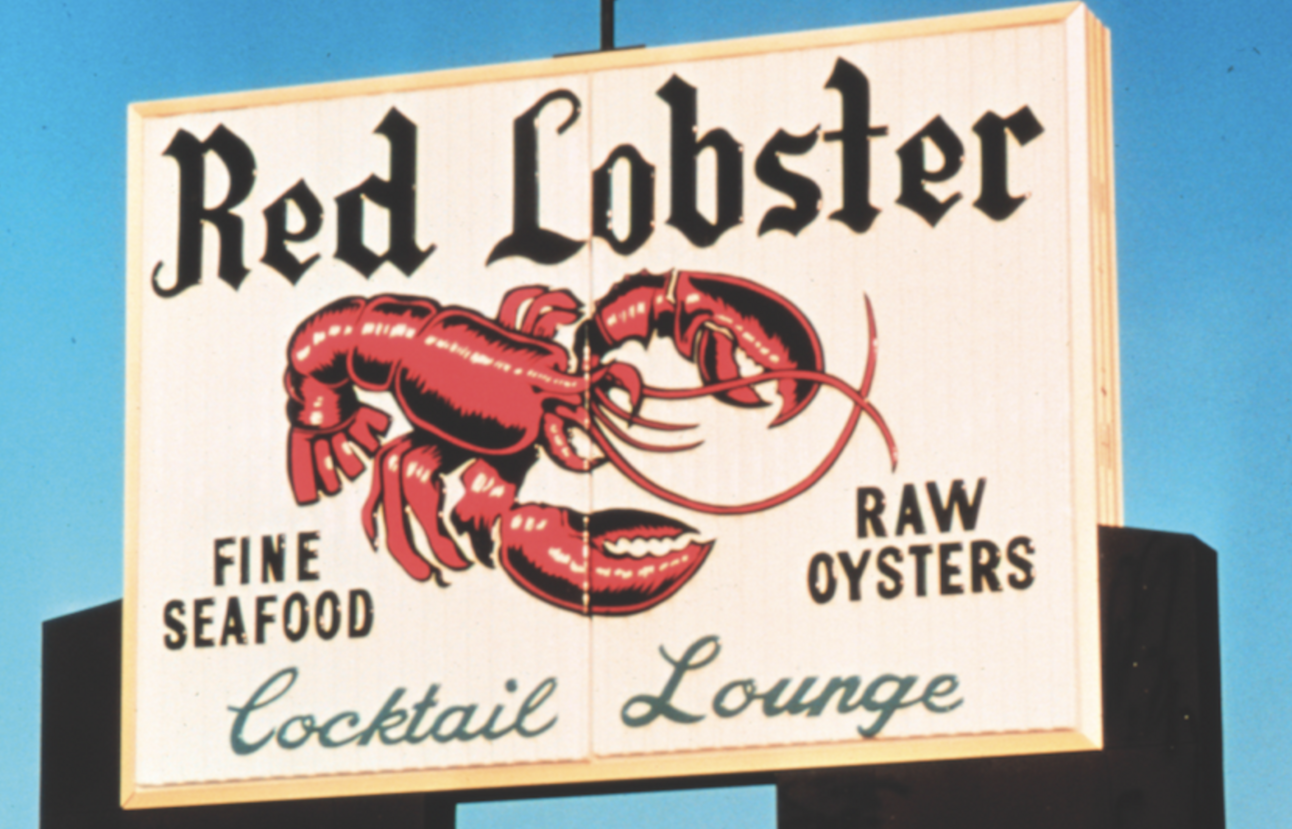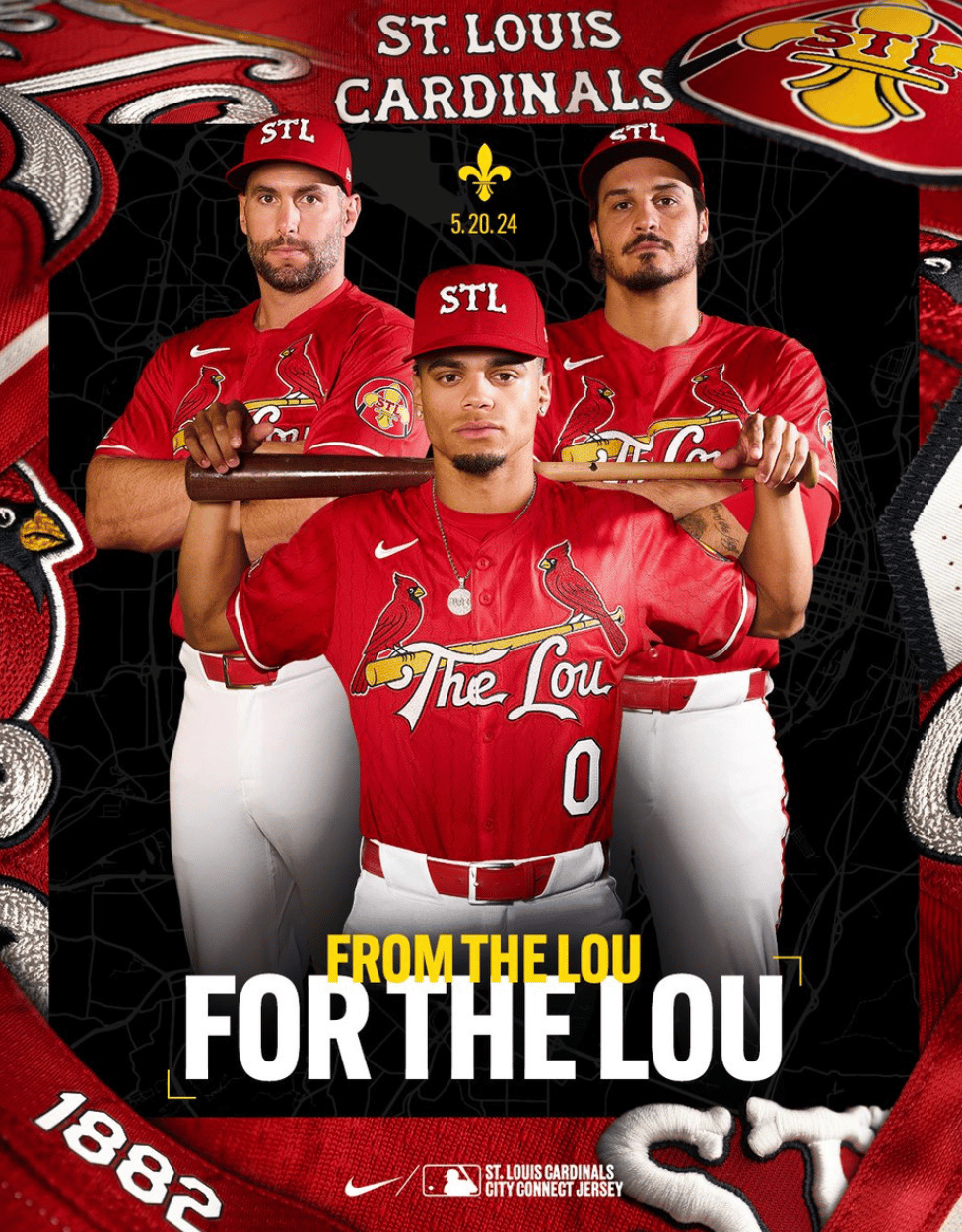Cup of Coffee: May 21, 2024*
David Fletcher is in trouble, the Cards' City Connects, a bad guy, a small ask, Columbus, voice notes, and what did NOT kill Red Lobster

Good morning! The asterisk on the title is because I delivered it wrong a few minutes ago and had to re-send. I’m not starting the day out well!
David Fletcher is in trouble, the Cardinals City Connect uniforms are . . . cinematic, and we remember some guy who, actually, I wish we did not remember.
In Other Stuff I have a small request of my New York readers, Columbus, Ohio is in the news but not how I’d like it to be, something floats, voice notes, a bankruptcy’s goats.
And That Happened
Here are the scores. Here are the highlights:
Padres 6, Atlanta 5; Atlanta 3, Padres 0: Atlanta had an early 5-0 lead in the first game and blew it thanks to six unanswered Padres runs, capped by a Manny Machado two-run double in the eighth. Jake Cronenworth had a two-run single earlier that inning. The shame here was that, for the first time in several days, Atlanta’s bats woke up to some degree, but the pen couldn’t hold the lead to which the lineup and starter Reynaldo López staked them.
In the nightcap, Chris Sale continued his marvelous-so-far comeback season, tossing seven scoreless innings, striking out nine, winning his seventh game of the year, and lowering his ERA to 2.22. Marcell Ozuna homered in both ends of the twinbill.
Bad news for San Diego, though: second baseman Xander Bogaerts injured his left shoulder while diving for a Ronald Acuña Jr. grounder in the third inning of the first game. Bogaerts immediately signaled to the bench for assistance when he hit the dirt. Initial scans after the game came up negative but there will be more testing, Mike Shildt said.
Guardians 3, Mets 1: David Fry singled in a couple of runs in the first and Kyle Manzardo in Fry in the fourth. Ben Lively — whose name sounds like a Marvel character who, due to some sort of industrial mishap becomes a superhero — combined with four relievers to strike out 11 batters. The Guardians have won seven of eight.
Blue Jays 9, White Sox 3: Daulton Varsho and Danny Jansen each hit a two-run home run, Bo Bichette had three doubles and four hits in all, and Vlad Guerrero reached base three times and drove in a run. This is the first time the Jays have won back-to-back games since April 28 and 29.
Marlins 3, Brewers 2: It’s not every day you see late game gumption from Miami, but they showed it here, Coming back from a 2-0 deficit late by getting RBI singles from Nick Gordon and Otto López in the seventh and ninth and then walking it off on a bases-loaded Josh Bell single in the bottom of the tenth. After the game Bell was asked about his approach for the game-winning hit. You won’t friggin’ believe this, but he said he “was just trying to put the ball in play” and “was fortunate enough to get it away from the infielders.” The Marlins have not won anywhere near enough to be adept and postgame cliches like this, but Bell has been around a while. He’s a pro, and pros have been trained to provide pro quotes like that.
Nationals 12, Twins 3: Luis García Jr. homered and drove in three, Jesse Winker hit a solo shot, and Eddie Rosario had three RBI via a couple of RBI singles to pace the Nats’ 14-hit attack. The win snaps Washington’s five-game skid and extends the Twins’ skid to seven. Earlier Minnesota had that 11-game winning streak. It’s like they’re channeling the 1987 Brewers, which is a team that will live rent-free in my head for the rest of my life, even if I can’t remember what I had for dinner last night.
Red Sox 5, Rays 0: Rafael Devers set a new team record by homering in his sixth consecutive game. Ted Williams never did that. Neither did Jimmie Foxx, Jim Rice, David Ortiz or anyone else, so that’s pretty cool. It was a two-run shot in the fourth. Ceddanne Rafaela hit a two-run shot of his own in the fifth. Tanner Houck was fantastic, blanking the Rays for seven innings on just two hits.
Mariners 5, Yankees 4: Marcus Stroman pitched shutout ball into the eighth but gave up a homer to Dominic Canzone before exiting. Still, the Yankees took a 4-1 lead into the ninth inning, they were 28-0 when leading after eight, and they had Clay Holmes coming in to lock it down, so no problem, right? Wrong. Holmes gave up a one-out single and a walk and then Luke Raley hit an infield single to second that Gleyber Torres threw away to allow a run to score. The next batter was Mitch Haniger who knocked in another run to make it 4-3. After another walk Canzone hit a sac fly to tie things up and then Ty France singled in Haniger to give the M’s the lead and, eventually the game. The four-run ninth ended the Yankees seven-game winning streak.
Royals 8, Tigers 3: Kansas City notches its fourth straight win thanks to homers from Michael Massey and Salvador Perez. Massey also rudely knocked Tigers starter Reese Olson out of the game by hitting him on the hip with a comebacker later on. It was all over with then seven straight Royals batters reached safely in the bottom of the sixth as part of a six-run sixth inning.
Cardinals 6, Orioles 3: Michael Siani’s three-run homer in the fourth — his first career longball — staked the Cards to a 5-0 lead. That was enough despite Gunnar Henderson’s three-run homer in the sixth. Postgame, Siani credited “taking it one at-bat at a time” for his success. There are a lot of reasons I could never be a beat writer, but my inability to hear that from a kid who just hit his first homer and not look back at him with the “really?” face is one of them.
Angels 9, Astros 7: Nolan Schanuel and Logan O’Hoppe each hit three-run homers and Jo Adell hit a solo shot in the Angels seven-run fifth inning. They all came off of Framber Valdez, who has had better nights (5 IP, 10 H, 8 ER). Zach Neto homered off of someone else in the sixth. The Angels have won four of five.
Dodgers 6, Diamondbacks 4: The Dodgers scored all of their runs in the third inning thanks to a Freddie Freeman grand slam and solo shots from Kiké Hernández and Will Smith. Otherwise, Yoshinobu Yamamoto was solid, allowing two runs on seven hits while striking out eight and pitching into the seventh inning. The Dodgers have won four in a row. And 33 of 50 if you wanna be a completist about such things.
The Daily Briefing
David Fletcher is probably gonna get suspended
Back when Ippei Mizuhara was busted for betting Shohei Ohtani’s money it was reported that he was introduced to the illegal bookie at the center of the case by then-Angels infielder David Fletcher. According to those reports Mizuhara, Fletcher, and the bookie met at a poker game, introductions were made, and stuff happened.
When that news came out my first thought was “there is no WAY Fletcher isn’t gonna be in deep shit over this.” My thoughts about such things have a pretty good batting average, and yesterday I got a solid base hit when ESPN reported that MLB has opened an investigation into allegations that not only did Fletcher end up at the same poker game with Mizuhara and the bookie, but that he placed bets with the bookie as well. Oh, and Colby Schultz, a former minor leaguer who is a friend of Fletcher, was said to have placed bets as well. Shultz allegedly wagered on baseball, including on Angels games in which his buddy Fletcher played. Whoopsie!
Fletcher currently plays on Atlanta’s Triple-A team, the Gwinnett Stripers. He’s not playing well and there’s really no realistic chance of him contributing meaningfully to the big club this season. Which, combined with this news, probably means we have seen the last of Fletcher in the big leagues.
MLB will nonetheless investigate and, I suspect, will level some heavy discipline in Fletcher’s direction. Assuming, that is, it can get information about his involvement in all of this from law enforcement because, as the linked article notes, it’s hard to see where else MLB could go to gather more evidence. The bookie has a criminal beef looming and won’t be talking to anyone. Fletcher and Shultz can just stonewall the league if they want and they will if they’re worried about criminal exposure. No one else who would actually know anything has any reason to cooperate with Rob Manfred’s investigators.
Not that that has stopped Rob Manfred before, but this is a bit of a different case and, compared to his outlaw days as the head of the Biogenesis investigation, Manfred has allegedly gone legit now.
Here are the Cardinals City Connect uniforms
Here ya go:

These 100% look like something you’d see in a movie about a St. Louis baseball team which did not have the budget to get the rights to use the actual Cardinals uniforms and logos and stuff. They’d be called “The St. Louis Songbirds” or something and the star would be someone on the James Marsden/Josh Hartnett tier.
Former Red Sox pitcher arrested in child sex solicitation sting
Remember Austin Maddox? Probably not, unless you were a diehard Red Sox fan seven or eight years ago. Maddox was a pitcher who bounced around Boston’s system for six years and had a 13-game cup of coffee with the big club back in 2017 and made a couple of postseason appearances that year as well. He’s been out of baseball a while but he made the news in Florida recently:
A former Boston Red Sox pitcher was recently arrested in an undercover child predator sting after authorities say he solicited an underage girl for sex and then traveled to meet her.
Austin Maddox, 33, of Jacksonville, Florida, is charged with traveling to meet after using a computer to solicit a child, solicitation of a child via computer to engage in sexual conduct, unlawful use of a two-way communication device, and producing or promoting performance which included sexual performance by a child, a Jacksonville Sheriff’s Office arrest report indicated.
Based on his mugshot he didn’t come out of the arrest all that well:

I do not approve of police roughing up suspects, and that holds no matter how heinous a crime they are accused of. That said, I will be putting Maddox’s swollen-shut shiner on the absolute bottom of my “things to be outraged about” pile. I promise I’ll get to it. One day. Maybe.
Other Stuff
A request for my New York readers
Carlo, the Official Son of Cup of Coffee,™ is planning to go to New York in mid-August to see his favorite band, King Gizzard and the Lizard Wizard, play two shows at Forest Hills Stadium in Queens. Unlike his trip to see them in Chicago last year I will probably not be accompanying him. He’ll be going with a friend on a “dude, we should totally go to New York and see Gizz!” kind of deal. I’d say “oh to be young again,” but it’s not like I don’t have like eight concerts on two different continents planned for the next six months, so let’s leave generational cliches out of this.
My question, which he has asked me to pass along to the group: where should he stay for his trip?
Just eyeballing it, it strikes me that the best and easiest bet would be for him to stay in Midtown someplace where he can just take the E train to the venue. If indeed Midtown is the best plan I can help him find a place, no problem, as I’ve been many times before. If, however, anyone has a superior plan for the venue based on personal experience, I am all ears as to recommendations.
And yeah, I’ve read up on Forest Hills’ renaissance as a concert venue and just how much the locals hate it because of the noise. If you happen to be one of them, I apologize in advance for the amount of noise Carlo will be contributing, as I suspect it will be considerable.
Thank you in advance for your thoughts and suggestions.
Hey, Columbus is in the news!
Normally folks at the Columbus convention and visitors bureau love it when the city is featured in a national publication. I feel like they’re not going to be as happy about Columbus making the New York Times yesterday:

The story uses Columbus as a case study of an outbreak of gun-related homicides during and just after the pandemic and highlights a couple of more notable murders that have taken place here in recent years. While it correctly notes that 2024 has seen an extremely sharp drop in homicides in Columbus, the general arc of the story is pretty accurate and groks the general dynamic.
The dynamic is pretty simple, and is perfectly captured in the case which is used to set the scene at the top of the story. It involved a rather dumb neighborhood dispute/misunderstanding, peppered by a wild card neighbor who was later found to be suffering from PTSD. It was the sort of thing that, in an earlier era, would’ve, at most, resulted in some low-level street fight with some fists thrown. But because everyone is armed to the teeth now everyone involved had a gun, a man ended up dead, and multiple people’s lives were ruined.
And why is everyone armed to the teeth? Because the Republicans who run this state have eliminated virtually all gun laws and have passed irresponsibly permissive stand-your-ground laws which embolden would-be vigilantes and tough guys. So stupid disputes escalate beyond all reason.
Actually, it’s more galling than that. Not only did state-level Republicans eliminate all gun laws, they then preempted cities from passing their own gun laws. When the cities tried to challenge this on home rule grounds, state Republicans successfully fought to stop city gun ordinances in court. Then, after the gun violence spiked, they blamed "Democrat-run cities" for the rising gun violence. It makes a person want to scream but, in Ohio, no one is listening and no one cares.
“Seem”
Boats floating? Now I’ve seen everything. Someone explain this to me. NASA explanations don’t count.
Don’t you dare
A trend piece in the Washington Post about voice notes:
From house-party bathrooms to internet culture, voice notes are having a moment. Threading a needle between texting and calling, the audio messages are emerging as an alternative to typing on phones. Some say they’re a welcome peek into the emotional states of friends when in-person conversations are rare. Others watch the messages pile up and feel like they’re getting homework. Like all tech trends, the popularity of voice notes tells us about the connections people crave.
I guess this is Trend Piece Week at Cup of Coffee. I keep reading them and they also keep making me angry. Part of this, I will admit, is that I am broadly cranky this week for a handful of unimportant reasons, but part of this is because I’m somehow more sensitive to the architecture of trend pieces at the moment and they’re annoying me. Against that backdrop:
- If I was an editor I would immediately fire any reporter who submitted a story to me which included the phrase "[trend] is having a moment." No warnings. No appeal. I would immediately confiscate their keycard. This is 85% about my personal dislike of the phrase “having a moment.” But it's also lazy. You're writing a trend piece. Don't start with the piece-justifying and conclusory phrase about how your subject is, in fact, a trend. Write about the trend and explain it. Show me don’t tell me.
- Also, as I mentioned in yesterday’s thing about fragrances, most trend pieces are about what the writer's friends or peers are doing and, because of the way people consume media, these stories tend to reflect readers' own habits. I suppose the business people at newspapers would point out that they get more clicks from people when they’re having their own reality reflected back at them, but I wish there were more stories about trends among people who aren't stereotypical Washington Post or New York Times subscribers like me. I know how I spend my days and it’s frankly boring. Educate me about people and stuff I don’t know.
Also: while I’m fine with “hey, sorry I missed you, call me back,” there is nothing I dread more than someone leaving me a substantive voice mail, so if you send me a voice note I’m going to get even crankier than I already am.
In closing, I am not a crackpot.
Endless Shrimp did not kill Red Lobster
The restaurant chain Red Lobster filed for Chapter 11 bankruptcy protection yesterday. In its press release the company blamed “a difficult macroeconomic environment, a bloated and underperforming restaurant footprint, failed or ill-advised strategic initiatives, and increased competition.” Almost every news story about the bankruptcy has cited the chain’s disastrous “endless shrimp” promotion which, in a case of life-imitating-”The Simpsons,” cost it millions after it underestimated how much shrimp people could eat if given the chance. I suppose that’s what the company meant by “ill-advised strategic initiatives.”
The “endless shrimp” promotion didn’t help, of course, but Red Lobster, like any retail chain of size, could weather a bad quarter based on a dumb promotion. That cost them eight figures against billions in annual revenue. Not good, but certainly not fatal. And yeah, people’s dining out habits have changed a good bit over the years, with Red Lobster not exactly rating high on the list of whatever the hot restaurant-going demographic happens to be. But that’s not what killed Red Lobster either.
What killed Red Lobster was Wall Street greed in the form of private equity owners which bled the restaurant dry, cashed in on it in major fashion, and made their getaway before anyone realized what was happening. It’s a classic and all-too-common private equity story and almost none of the outlets reporting on the bankruptcy filing have bothered to mention it.
I’m sure I’ve lectured you all about the insidious nature of private equity before, but in case you missed it, the m.o. is this:
- A private equity concern purchases a company in a leveraged buyout, either paying for it with debt or by pledging the assets of the company it is targeting for future sale. The important thing here is that the investors do not use their own money;
- Once in possession of the company, it either places all of the debt on the business itself — the investors themselves are protected by layers of corporate structure — or sells off the assets it pledged to sell off. The shareholders are paid off either way, so they’re happy;
- The underlying business, however, still has to soldier on, either laden with tons of debt, the servicing of which eats into business revenues, or it has to soldier on without the assets the private equity owners sold off to finance the deal;
- With restaurants and retail those assets are almost always in the form of real estate. The actual land underneath the stores. But since the business still exists, it is forced to then lease-back the land it once owned, which also cuts into revenues. It can be a combination of both debt and asset sales, of course;
- On top of all of that, the private equity purchasers almost always form “management companies” to actually run the business. Such management companies charge the underlying business tremendous “management fees” for the privilege of being run by these geniuses of capitalism. And they often install a layer of highly-paid executives who come from their own ranks. Those fees and those salaries also come out of business revenues.
The upshot: when private equity comes in it risks almost no money of its own but, like a parasite, sucks all of the life out of the business, at which point it swims away much richer than before. Once the business dies the press almost always says “oh, hey, that venerable old retailer/manufacturer/newspaper/hotel chain went bankrupt. I guess they just didn’t adapt to the times!”
As Business Insider reported earlier this month — and it was one of the only places to actually report this — In the case of Red Lobster it worked like this:
In 2014, Red Lobster’s parent company, Darden Restaurants, sold the chain to a San Francisco-based private equity firm called Golden Gate Capital for $2.1 billion. To raise the cash to make the deal happen, Golden Gate sold off Red Lobster's real estate to an entity called American Realty Capital Properties, pocketed the proceeds, and then American Realty Capital Properties leased the restaurants back, which suddenly strapped the restaurants with rent expenses they never had before. Not long after that Golden Gate Capital sold off the company to two other companies and moonwalked away, having profited on the purchase/real estate deal and, I am sure, having sucked up millions in management fees.
This pattern has felled big brand named companies like Red Lobster and Toys R Us, but it’s done much the same thing to the healthcare sector — particularly with nursing homes and small-to-medium-sized hospitals — the apartment building and rental mobile home market, and all across print and broadcast media. When the businesses in these markets fold you see stories about how Amazon is killing brick-and-mortar retail, healthcare companies don’t know how to be successful, and the newspaper and local radio business is dead. You rarely if ever hear about how Wall Street vampires played a tremendous if not dominant role in killing them.
Why can they get away with this? In large part because our country’s business and financial laws and regulations openly encourage it. As the attorney and author Brendan Ballou wrote in his 2023 book Plunder: Private Equity’s Plan to Pillage America:
“[P]rivate equity firms benefit from a legal double standard: They have effective control over the companies their funds buy, but are rarely held responsible for those companies’ actions. This mismatch helps to explain why private equity firms often make such risky or shortsighted moves that imperil their own businesses. When firms, through their takeovers, load companies up with debt, extract onerous fees or cut jobs or quality of care, they face big payouts when things go well, but generally suffer no legal consequences when they go poorly. It’s a ‘heads I win, tails you lose’ sort of arrangement — one that’s been enormously profitable.”
And it’s not going anywhere. Because private equity companies are not just greedy. They’re savvy. Their boards are filled with powerful people who either just left or plan to return to high-ranking government positions and who serve as fantastic lobbyists for their cause. Again, Ballou:
“Lobbying disclosure forms for the largest firms are filled with the names of former chiefs of staff, counsels and legislative directors. [The Carlyle Group], for instance, at various times employed two former F.C.C. chairmen, a former S.E.C. chair, a former NATO supreme allied commander, a former secretary of state and a former British prime minister, among others.
The scariest, creepiest, conspiracy theory-flinging dude who camps out in the corner of your local dive bar will tell you that that the whole damn system is rigged, man, and everyone is in on it. You should stay away from that guy on general principle but he’s not wrong about everything.
I don’t have any love or nostalgia for Red Lobster. I haven’t been to one in like 11 years, I think, and I’ve probably only been twice in my entire adult life. I’ll also observe that, nah, they don’t appear to be the best-run restaurants on the row, and based on what can be observed from afar, its various owners have not exactly invested tons of money in the concern.
But the Cheddar Bay Biscuits kept the lights on for a like 25 years before the chain began circling the drain. Things really went to hell once the P.E. vultures came on the scene. Maybe we should talk more about that than “hahaha, they thought they could make money giving middle America endless shrimp!”
Feed your children on crayfish and lobster tails.
And have a great day everyone.




Comments ()